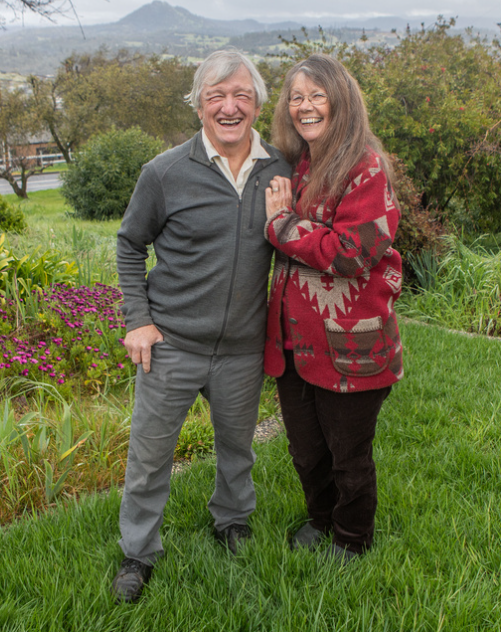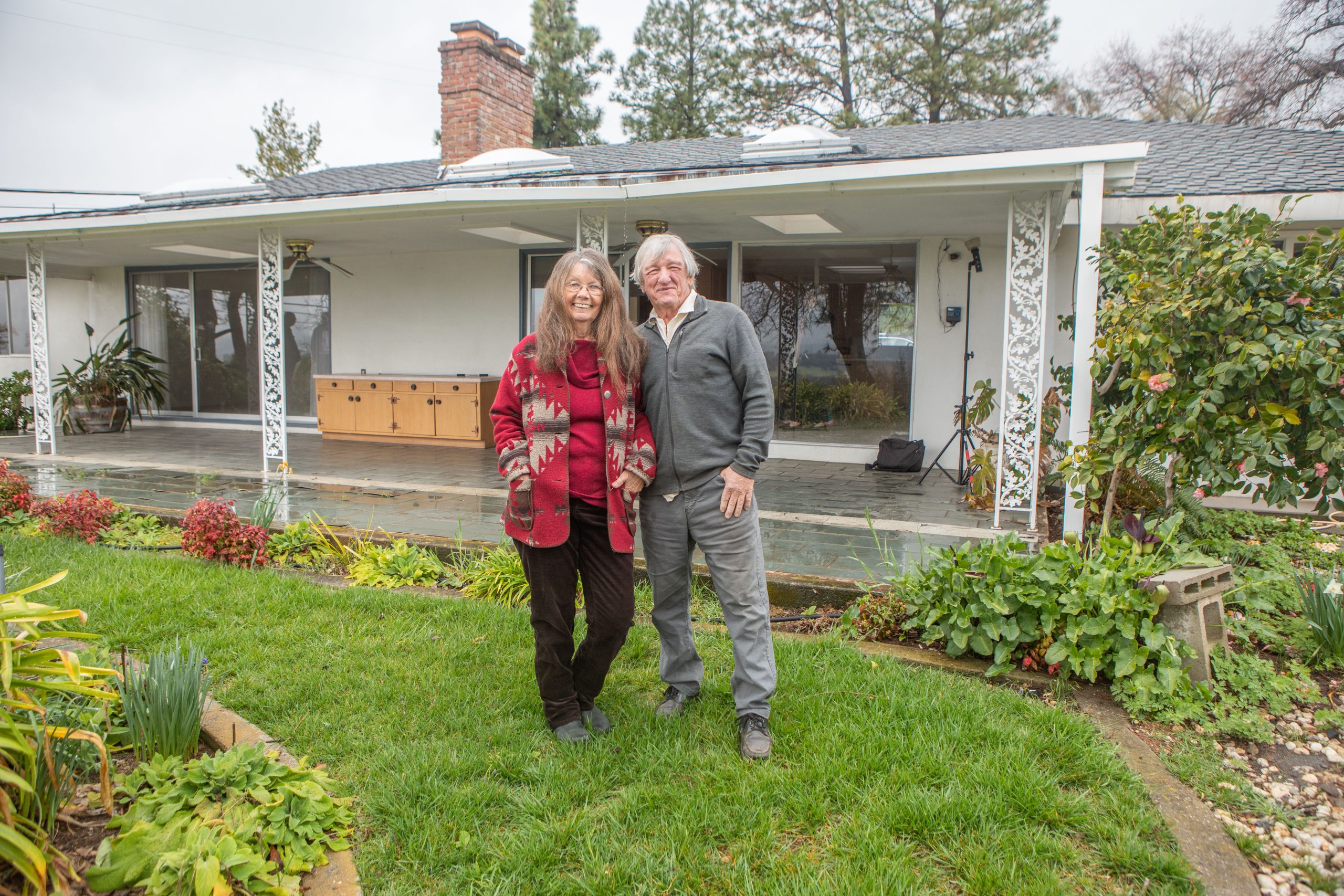Dr. Paul Beatty and Debra Lawlor in front of the Jackson, Calif. home their philanthropic gift made possible to support resident physicians and visiting medical students training at Sutter’s Rural Family Medicine Residency program.
By Rachel Lee, Vitals contributor
Standing in the smoldering ruins of what had once been their home, Dr. Paul Beatty and his wife, Debra Lawlor, faced a future leveled by fire. The Butte Fire had ripped through Amador and Calaveras counties on Sept. 15, 2015, and with it erased the Beatty/Lawlor house and belongings — everything.
When Dr. Beatty finally made it home from a shift in the Sutter Amador Emergency Department, he found only ash. And in the center of it, Debra, who had tried to rescue their goats, horses, dogs and chickens, turned to him and said, calmly but clearly, “We live right here.”
That was the moment everything changed.
“There were 48 hours of doubt,” Dr. Beatty recalls. “But then that happened, and we realized — we’re not going anywhere.”
What followed was years of rebuilding. First, the slab where Debra’s pottery studio had stood was repurposed into a small dwelling. Then came the barn — with room for horses, tool storage, a saloon and a dance floor. And finally, after two years of planning and construction, the house.
Building Community and Connection
Now, a decade later, Dr. Beatty and Debra are creating a different kind of home: one for future physicians. For more than 40 years, Dr. Beatty and Debra have called the Sierra Nevada foothills home — a place they chose to return to and rebuild, not just for themselves, but for the community they love. Their decision to stay reflects a deep loyalty to both the region and Sutter Amador Hospital, where Dr. Beatty spent the majority of his emergency medicine career.

Dr. Paul Beatty, with his wife, Debra Lawlor, says of the house: “Giving this gift was one of the most liberating things I’ve ever done. I’ve seen people chase money their whole lives, and it rarely makes them happy. This was a step beyond what I’d done before — and it really set me free.”
Thanks to a generous philanthropic gift from Dr. Beatty and Debra, Sutter Amador Hospital was able to purchase a three-bedroom home in Jackson, Calif., to house residents and visiting medical students training in the hospital’s rural medicine track. The house represents more than shelter. It’s a source of stability and peace for physicians who are learning to care for others.
Dr. Beatty understands that intimately. He and Debra met in college and stayed together through his medical school, residency and fellowship training.
“Housing was always a stumbling block,” Dr. Beatty said. “We stayed in some run-down apartments in bad neighborhoods — anywhere we could afford. It made everything harder.”
When Dr. Beatty sat down with physician and philanthropic leaders and asked what the greatest unmet need was, he heard loud and clear: brick and mortar.
“Giving this gift was one of the most liberating things I’ve ever done,” Dr. Beatty said. “I’ve seen people chase money their whole lives, and it rarely makes them happy. This was a step beyond what I’d done before — and it really set me free.”
He admits he was unsure at first about sharing the story publicly. “But,” he says, “if it encourages even one other person to give back, or to talk about why this kind of work matters, it’s worth it.”
Generosity Fuels Purpose and Promise
The impact of the Beatty/Lawlor gift goes beyond the walls of the home. It supports a growing program designed to address the rural physician shortage in California. About 20% of the U.S. population lives in rural areas, but only 11% of doctors practice there. Sutter’s Rural Training Track aims to change that — starting with the Amador community.
Candidates accepted into the program spend their first year at Sutter Medical Center, Sacramento, before relocating to Sutter Amador Hospital for their second and third years. Dr. Jennifer Shoemaker, who oversees the rural residency track, says that housing has long been a barrier to recruitment and retention.
“This changes that,” she says.
Dr. Beatty spent 40 years practicing in the Sutter Amador Emergency Department. He remembers when physicians came out of training eager to work long hours and chase big paychecks. That’s changed.
“Today’s residents want balance,” he said. “They want benefits, a livable wage, a place to build a life — not just a career.”
One of the first two graduates of the rural track has already accepted a full-time role in nearby Plymouth. Six more residents are currently training in the program, and more are expected to rotate through the newly purchased home starting in the third quarter.
And Dr. Beatty and Debra? They’ll be there to welcome them.
A decade after the fire that changed everything, Dr. Beatty and Debra are opening their arms — and their community — to young physicians just beginning their journey. They’re giving these future doctors what they themselves once lost: a place to call home.
“We might even throw a Fourth of July party,” Dr. Beatty said. “We want them to fall in love with this place like we did.”
Help us build a future where doctors can train, live and thrive in the communities that need them most. To support rural medical education at Sutter Health, visit Sutterhealth.org/giving or contact Jody Boetzer, Senior Philanthropy Officer, at (209) 418-4020 or jody.boetzer@sutterhealth.org.





